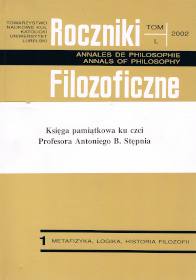Troubles with the truth
Abstract
The article consists of two parts. In the first one the author, referring to Alfred Tarski's and Antoni B. Stępień's views and contesting them, presents his own definition of 'truth', changing his former views in this respect. The definition is constituted by the formula:
(ε 0) /\x [x is true ≡ \/y∈R (x states y)],
which may be read in the following way:
a sentence is true if it states a certain real (occurring) state of things.
The above definition is consistent with the so called (J)[adacki's] convention that, contrary to the so called (T)[arski's] convention avoids certain difficulties, e.g. possible entailing, through occurrence of an extra-linguistic state of things, existence of a respective true sentence. This definition also does not get entangled either in accepting purely intentional or negative state of things. Using the opportunity to do so the author proclaims himself in favour of the evidential criterion of truth, contradictory criterion of falsehood, and pragmatic criterion of faith.
In the second part of the article the author replies to the questions concerning his theses that were put during the discussion 'in the company of Professor Stępień's pupils and his pupils' pupils. Especially he answers the charges and questions brought by Dr. Paweł Garbacz. They mainly focused on the problems of falsehood. The author admits two conceptions of falsehood: a false sentence does not state anything, or, a false sentence states a presented (fictitious) state of things.
Copyright (c) 2002 Roczniki Filozoficzne

This work is licensed under a Creative Commons Attribution-NonCommercial-NoDerivatives 4.0 International License.





